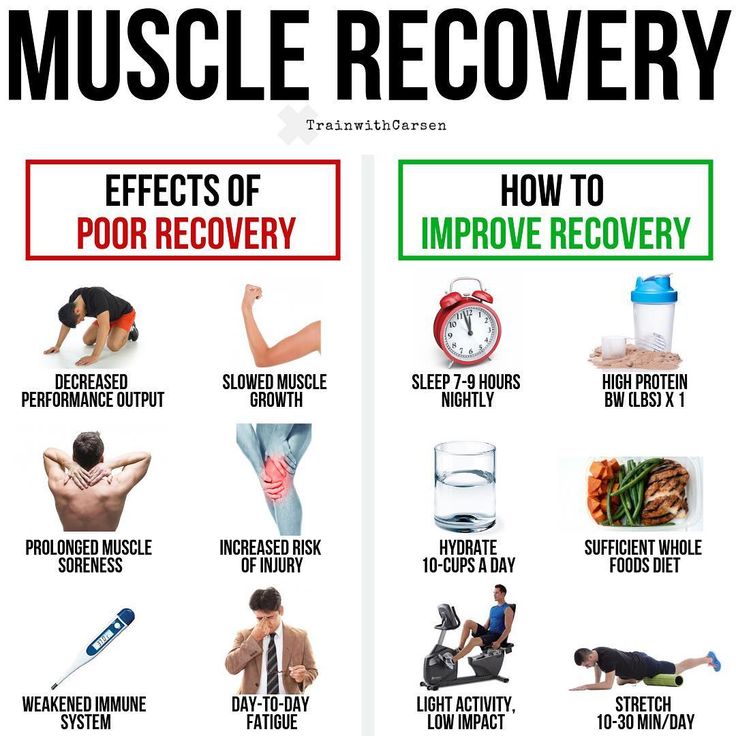During intense training, muscles, joints, and tendons are exposed to overload and micro-injuries. At the same time, numerous biochemical processes occur in the body — including muscle glycogen depletion and muscle fiber damage. These can lead to inflammation, which may interfere with physical performance and increase the risk of injury.
To allow the body to repair the damage and restore physical readiness, it’s crucial to ensure proper recovery. This process takes place at the cellular level and is essential for physical development and athletic performance. That’s why learning how to speed up muscle recovery is a vital skill for any athlete.
Muscle recovery after a workout is all about restoring energy reserves so the body can prepare for the next physical effort. It’s a return to full physical and mental capacity — essential for reaching your fitness goals.
Why Is Recovery After a Workout Important?
Proper recovery allows the body to heal microtraumas, replenish glycogen stores, and speed up muscle repair. Moreover, post-workout rest reduces the risk of overtraining, injury, and exhaustion, while promoting optimal performance.
Recovery also helps reduce fatigue and supports the adaptation of muscles, tendons, and joints to stress. By managing recovery well, athletes can limit catabolic processes and maximize the effects of training.
On a psychological level, recovery helps maintain motivation and mental well-being. Without it, athletes may face stress, emotional burnout, or loss of training enthusiasm. In contrast, speeding up recovery after workout can help maintain balance and keep you engaged in the process.
How Long Does Muscle Recovery Take?
The duration of muscle recovery after workout depends on several factors: age, fitness level, exercise intensity, and health status. Nutrition and the muscle groups involved also play a role.
As a general guideline:
- Light to moderate training: ~24 hours for recovery.
- Intense sessions (e.g., interval training): 48–72 hours.
Professional athletes typically recover faster than beginners, due to their conditioning and recovery strategies.
How to Speed Up Muscle Recovery After Training
There are several strategies for how to speed up muscle strain recovery and help your body bounce back faster:
- Nutrition. Fuel your body with a proper balance of macronutrients.
- Stretching. Helps release muscle tension and improve flexibility.
- Active recovery. Light activities like walking or swimming can speed up recovery from workout.
- Sleep. Essential for cellular regeneration and hormone production.
- Hydration. Maintains electrolyte balance and supports muscle repair.
All of these combined offer the best way to speed up muscle recovery naturally.
Post-Workout Nutrition — What to Eat?
Diet plays a central role in recovery. To speed up muscle healing, include сomplex and simple carbs, high-quality proteins — rebuild muscle tissue, healthy fats — aid in vitamin absorption, vegetables — deliver essential micronutrients
Post-workout meal ideas:
- Oatmeal with milk, fruits, and nuts.
- Whole grain pasta with tuna and spinach.
- Avocado toast on whole grain bread.
- Salad with egg, nuts, and mozzarella.
- Brown rice with grilled chicken and vegetables.
- Protein shake with peanut butter.
Research suggests certain foods may speed up muscle soreness recovery, such as beetroot, cherry juice, pomegranate juice, and anti-inflammatory compounds like curcumin, quercetin, and isothiocyanates found in kale, turmeric, blueberries, and broccoli.
Supplements for Muscle Recovery
While moderate exercisers can meet needs through food, those under high physical stress may benefit from supplements that speed muscle recovery:
- Carbohydrate supplements.
- Protein powders.
- EAA and BCAA.
- Vitamins and minerals.
Proper use of these can significantly speed up muscle recovery time and minimize soreness.
Anavar Oxandrolone 10 mg for Muscle Repair
Some athletes incorporate Anavar Oxandrolone 10 mg (like from driadashop.to) into their recovery strategy. Oxandrolone is a mild anabolic steroid that can speed up muscle injury recovery, reduce catabolism, and help preserve lean muscle mass. It’s known to accelerate muscle strain recovery, enhance protein synthesis, and promote faster healing after workouts. Used responsibly under medical supervision, it supports strength gains, speeds up muscle tear recovery, and reduces post-exercise fatigue.
The Role of Sleep in Muscle Recovery
Sleep is one of the most powerful tools to speed up recovery from muscle strain. During deep sleep, growth hormone levels rise, muscle fibers repair, and inflammatory markers decrease.
Improved sleep quality enhances sports performance and reduces injury risk. Sleeping 7–9 hours a night is one of the most natural ways to speed up recovery from exercise.
Stretching and Regeneration
Stretching post-workout improves blood flow and flexibility, decreases tension, and helps speed up muscle soreness recovery. Regular full-body stretching contributes to mobility, posture, and even stress relief.
Recovery Techniques and Tools
To support speed up recovery from muscle soreness, athletes often use:
- Hot/cold baths. Soothe inflammation and stimulate circulation.
- Contrast showers. Expand and contract blood vessels.
- Massage. Eases DOMS and reduces inflammation.
- Foam rolling. Promotes blood flow and reduces tightness.
- Sauna sessions. Support detox and relaxation.
These techniques are proven ways to speed up muscle recovery and prevent stiffness.
Active Recovery — Gentle but Effective
Active recovery includes light movement like walking, cycling, or yoga. These low-intensity sessions:
- Enhance circulation
- Reduce soreness.
- Help with speeding up recovery after workout.
They’re ideal for preventing complete inactivity without stressing the body further.
What Is the Best Way to Speed Up Muscle Recovery?
A smart training plan must include structured recovery. Finding your personal method for how to speed up muscle recovery takes time and self-awareness. Try different strategies and listen to your body — it will tell you what works best.
Whether you’re recovering from soreness or a strain, knowing how to quicken recovery in muscles and what speeds up muscle recovery is the key to long-term success.


